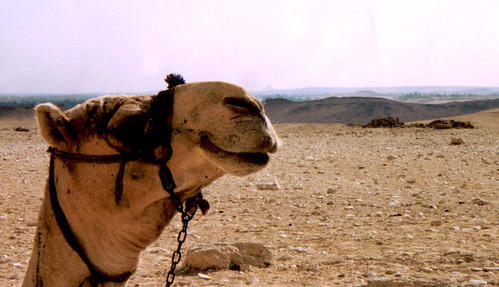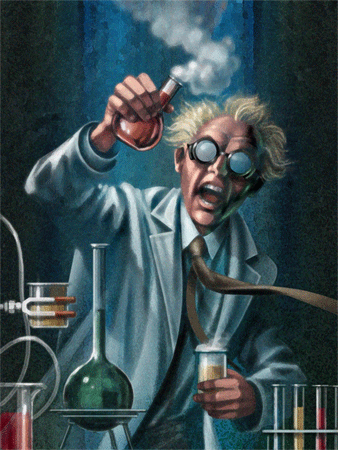According to Dennis Overbye you don’t:
Having just lived through another New Year’s Eve, many of you have just resolved to be better, wiser, stronger and richer in the coming months and years. After all, we’re free humans, not slaves, robots or animals doomed to repeat the same boring mistakes over and over again. As William James wrote in 1890, the whole “sting and excitement†of life comes from “our sense that in it things are really being decided from one moment to another, and that it is not the dull rattling off of a chain that was forged innumerable ages ago.†Get over it, Dr. James. Go get yourself fitted for a new chain-mail vest. A bevy of experiments in recent years suggest that the conscious mind is like a monkey riding a tiger of subconscious decisions and actions in progress, frantically making up stories about being in control.
As a result, physicists, neuroscientists and computer scientists have joined the heirs of Plato and Aristotle in arguing about what free will is, whether we have it, and if not, why we ever thought we did in the first place.
Whether or not we actually have free will is more or less an iteration of the underlying question in every philosophical debate: is there “truth” or “Truth”? In other words, does the world have any objective, substantive form, or do we just perceive such and place our own facile constructions upon it? One example used by the “truth” crowd is that in the very recent human past, phrenology was considered a legitimate science, and for centuries “bloodletting” was deemed a legitimate means of healing the sick. We call such things “quackery” today, but they were the “truth” back then. How can we be sure that any of what we think we know now is “Truth”?
The free will debate is centered on the same perception/reality argument. According to at least some scientists and philosophers, free will is but an illusion that we deceive ourselves into believe is real.
Mark Hallett, a researcher with the National Institute of Neurological Disorders and Stroke, said, “Free will does exist, but it’s a perception, not a power or a driving force. People experience free will. They have the sense they are free.
“The more you scrutinize it, the more you realize you don’t have it,†he said.
[...]
[Where free will means] that humans are free moral agents whose actions are not predetermined … Whatever choice you make is unforced and could have been otherwise, but it is not random. You are responsible for any damage to your pocketbook and your arteries.
“That strikes many people as incoherent,†said Dr. Silberstein, who noted that every physical system that has been investigated has turned out to be either deterministic or random. “Both are bad news for free will,†he said. So if human actions can’t be caused and aren’t random, he said, “It must be — what — some weird magical power?â€
Yeah, its called a “brain” and its bent on self-preservation, and pleasure-seeking/pain-avoidance, among other things. If we have a decision to act/not act then don’t we have free will? Dr. Benjamin Libet contends otherwise:
In the 1970s, Benjamin Libet, a physiologist at the University of California, San Francisco, wired up the brains of volunteers to an electroencephalogram and told the volunteers to make random motions, like pressing a button or flicking a finger, while he noted the time on a clock.
Dr. Libet found that brain signals associated with these actions occurred half a second before the subject was conscious of deciding to make them.
The order of brain activities seemed to be perception of motion, and then decision, rather than the other way around.
In short, the conscious brain was only playing catch-up to what the unconscious brain was already doing. The decision to act was an illusion, the monkey making up a story about what the tiger had already done.
Dr. Libet’s results have been reproduced again and again over the years, along with other experiments that suggest that people can be easily fooled when it comes to assuming ownership of their actions
OK, but how many of the requested actions were things like “stick your finger in your eye” or “grab your crotch really hard”? Would the brain signals have been similar in such circumstances. If the subjects were already in the frame of mind to carry out the directions, what decision was there to make? Hadn’t they already freely willed themselves to follow orders, instead of taking each direction and making a decision as to whether or not to follow it? Would that Bartleby, the Scrivener, was a subject, I doubt the results would be the same. It seems to me there’s a significant distinction.
Obviously this argument over the existence vel non of free will includes a moral component as well.
So what about Hitler?
The death of free will, or its exposure as a convenient illusion, some worry, could wreak havoc on our sense of moral and legal responsibility. According to those who believe that free will and determinism are incompatible, Dr. Silberstein said in an e-mail message, it would mean that “people are no more responsible for their actions than asteroids or planets.†Anything would go.
It would certainly call into question the need for and the efficacy of laws, rules and regulations. If we are “nothing more than sophisticated meat machines” then of what use is it to prohibit or mandate certain actions or omissions? Seemingly the answer would be “none.”
Dr. Wegner of Harvard said: “We worry that explaining evil condones it. We have to maintain our outrage at Hitler. But wouldn’t it be nice to have a theory of evil in advance that could keep him from coming to power?â€
Again, doesn’t that beg the question, “how would we stop such a thing if we have no free will?” If the idea is that humans simply react to electro-chemical impulses, what gives us any control over that? If we are indeed not making decisions, by what mechanism do we direct future actions? The article proposes a middle ground of sorts:
Dr. Libet said his results left room for a limited version of free will in the form of a veto power over what we sense ourselves doing. In effect, the unconscious brain proposes and the mind disposes.
[...]
Dr. Dennett, the Tufts professor, is one of many who have tried to redefine free will in a way that involves no escape from the materialist world while still offering enough autonomy for moral responsibility, which seems to be what everyone cares about.
The belief that the traditional intuitive notion of a free will divorced from causality is inflated, metaphysical nonsense, Dr. Dennett says reflecting an outdated dualistic view of the world.
Rather, Dr. Dennett argues, it is precisely our immersion in causality and the material world that frees us. Evolution, history and culture, he explains, have endowed us with feedback systems that give us the unique ability to reflect and think things over and to imagine the future. Free will and determinism can co-exist.
“All the varieties of free will worth having, we have,†Dr. Dennett said.
“We have the power to veto our urges and then to veto our vetoes,†he said. “We have the power of imagination, to see and imagine futures.â€
In this regard, causality is not our enemy but our friend, giving us the ability to look ahead and plan. “That’s what makes us moral agents,†Dr. Dennett said. “You don’t need a miracle to have responsibility.â€
Dr. Dennett’s explanation is fairly innocuous, and it seems to provide a meaningful way to discern instinctual actions from purposeful ones. But it still doesn’t explain everything. Our free will may indeed be informed by causality (i.e., feedback from history, culture, evolution), and thus guide us in plotting our next course, but how do you explain those who refuse to take such feedback into account? For example, despite the appalling lack of any success generated by socialist/communist/statist governments, the model is repeatedly tried again and again, apparently with the fervent belief that the next iteration will be different than the last. How does Dennett’s theory explain that?
Overbye’s article is very interesting, and I recommend that you read the whole thing. Personally, I think that if free will is no more than an illusion, masking the impulsive activity of our untamed and untamable synapses, then progress, imagination, creations and discoveries would all be impossible. Without free will, how does a place like the United States come into existence? How can a vision of air flight be realized, or a cure for cancer? The short answer is that, without free will, you have none of this.
However, I do agree that we as humans are not, and cannot, be entirely divorced from the material world, nor is our will entirely independent of our physical surroundings and capabilities. No matter how much I may wish to do so, nor how much I will it, I will never and could never be a Defensive End for the Chicago Bears. Yet, I have the free will to try, no matter how ludicrous the suggestion. We sometimes call this “heart” (think “Rudy” or Brett Favre), or foolishness (think William Hung or Brett Favre). In either case, the actor chooses the action and wills himself towards his final disposition, whether that be success or failure. The ultimate result may be determined by physics and physiology, but the actions themselves were undertaken based on the will of the subject.
In the end, perhaps we are just a big mess of chemicals and neurons, acting randomly or in some predetermined fashion, without any actual choice over our actions, although we perceive it as such. Or maybe, as someone suggested in the article, we are like a giant computer that is so complex it can’t figure out what it will do next (where have I heard this before?), and thus has the illusion of free will. Of course, it does make you wonder then, if that is all there is to it, how can we perceive it? Indeed, how can we come up with the question in the first place? I guess I’ll never know … or will I.
Technorati Tags: free will, philosophy, religion, morality
Sphere: Related Content





 as religion:
as religion:
 I guess “man bites dog” is :
I guess “man bites dog” is :


 Those of you who approach this story with a libertarian bent, will of course have no problem understanding how such incompetence could be allowed not only to form the basis of scientific studies but to also be one of the driving forces behind AGM and the draconian policies being pushed by its adherents.
Those of you who approach this story with a libertarian bent, will of course have no problem understanding how such incompetence could be allowed not only to form the basis of scientific studies but to also be one of the driving forces behind AGM and the draconian policies being pushed by its adherents. Some choice bits:
Some choice bits:

